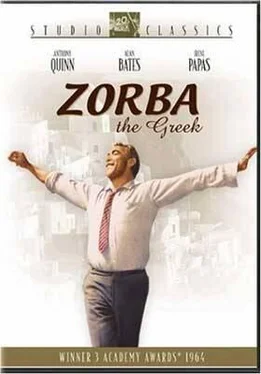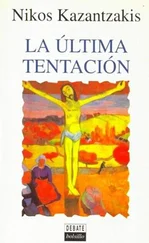Nikos Kazantzakis - Zorba The Greek
Здесь есть возможность читать онлайн «Nikos Kazantzakis - Zorba The Greek» весь текст электронной книги совершенно бесплатно (целиком полную версию без сокращений). В некоторых случаях можно слушать аудио, скачать через торрент в формате fb2 и присутствует краткое содержание. Жанр: Современная проза, на английском языке. Описание произведения, (предисловие) а так же отзывы посетителей доступны на портале библиотеки ЛибКат.
- Название:Zorba The Greek
- Автор:
- Жанр:
- Год:неизвестен
- ISBN:нет данных
- Рейтинг книги:3 / 5. Голосов: 1
-
Избранное:Добавить в избранное
- Отзывы:
-
Ваша оценка:
- 60
- 1
- 2
- 3
- 4
- 5
Zorba The Greek: краткое содержание, описание и аннотация
Предлагаем к чтению аннотацию, описание, краткое содержание или предисловие (зависит от того, что написал сам автор книги «Zorba The Greek»). Если вы не нашли необходимую информацию о книге — напишите в комментариях, мы постараемся отыскать её.
Zorba The Greek — читать онлайн бесплатно полную книгу (весь текст) целиком
Ниже представлен текст книги, разбитый по страницам. Система сохранения места последней прочитанной страницы, позволяет с удобством читать онлайн бесплатно книгу «Zorba The Greek», без необходимости каждый раз заново искать на чём Вы остановились. Поставьте закладку, и сможете в любой момент перейти на страницу, на которой закончили чтение.
Интервал:
Закладка:
I kept silent. Two equally steep and bold paths may lead to the same peak. To act as if death did not exist, or to act thinking every minute of death, is perhaps the same thing. But when Zorba asked me the question, I did not know.
"Well?" Zorba said mockingly. "Don't worry, boss, you can't argue that out. Let's talk of something else. Just now I'm thinking of the chicken and the pilaff sprinkled with cinnamon. My brain's steaming like the pilaff. Let's eat first, ballast up first, then we'll see. Everything in good time. In front of us now is the pilaff; let our minds become pilaff. Tomorrow the lignite will be in front of us; our minds must become lignite! No half-measures, you know."
We entered the village. The women were sitting in their doorways gossiping. The old men, leaning on their sticks, were silent. Under a pomegranate tree laden with fruit a little, shrivelled old woman was delousing her grandson.
In front of the café an old man with a grave, concentrated expression and an aquiline nose was standing erect. He had a distinguished air. He was Mavrandoni, the village elder who had rented the lignite mine to us. He had called the previous evening at Dame Hortense's to take us to his house. He said:
"It's a scandal for you to be staying at her hotel as if there were no men in the village."
He was grave, he weighed his words carefully as one of the leading villagers. We had refused. This had offended him, but he had not insisted.
"I have done my duty," he said as he departed. "You are free."
A little later he sent us two cheeses, a basket of pomegranates, a jar of raisins and figs, and a demijohn of raki. His servant said, as he unloaded his tiny ass:
"With the compliments of Captain Mavrandoni. It's nothing much, he asked me to tell you, but it's meant well."
We now greeted the head of the village volubly and cordially.
"Long life to you!" he said, placing his hand on his breast. Then he fell silent.
"He doesn't like to talk much," Zorba murmured. "He's an old stick."
"He's proud," I said. "I like him."
We were arriving. Zorba's nostrils were quivering joyously. As soon as Dame Hortense saw us from the threshold she uttered a cry and ran into the kitchen.
Zorba put the table in the yard under the leafless vine-arbor. He cut the thick slices of bread, brought the wine and set the table. He looked round at me wickedly and pointed to the table. He had set for three people!
"D'you see, boss?" he whispered.
"Yes, I see, you old rip!" I replied.
"It's the old birds who make the best stew," he said, licking his lips. "You take it from me."
He moved nimbly, his eyes sparkling. He hummed old love songs.
"That's the way to live, boss. Have a good time and the bird into the bargain. You see, I'm doing things now as if I was going to die next minute. And I'm making it snappy, so I don't kick the bucket before I've had the bird!"
"To table!" Dame Hortense ordered.
She lifted the pot and set it down in front of us. But she stood gaping. She had seen the three plates. Crimson with pleasure, she looked at Zorba and blinked her sharp, little periwinkle-blue eyes.
"She's got hot pants, all," Zorba whispered.
Then with extreme politeness, he turned to the lady and said:
"Beautiful nymph of the waves, we are shipwrecked and the sea has cast us in your realm. Do us the honor, my siren, of sharing our meal!"
The old cabaret singer opened her arms wide and closed them again as if she would have liked to embrace the two of us. She swayed gracefully, brushed against Zorba, then me, and ran, chuckling, to her room. Soon after she reappeared, twittering, flaunting her charms and dressed in her very best: an old shiny velvet dress, decorated with worn yellow braid. Her bodice remained hospitably open and on it she had pinned a full-blown artificial rose. In her hand she held the parrot's cage which she hung in the vine-arbor.
We made her sit between us, with Zorba to her right and me to her left.
We all three set to ravenously. For a long time we did not utter a word. We were feeding the beast and slaking its thirst with wine. The food was soon changed into blood, the world became more beautiful, the woman at our sides became younger every minute, the lines in her face were disappearing. The parrot, hanging in front of us in his green jacket and yellow waistcoat, leaned forward to watch us. He looked like some odd little fellow under a spell, or else the spirit of the old cabaret singer wearing a green-and-yellow dress. And above our heads the vine-arbor was suddenly covered with large bunches of black grapes.
Zorba's eyes were rolling, he flung open his arms as if he wanted to embrace the whole world.
"What's happening, boss?" he cried, in astonishment. "We drink one little glass of wine and the world goes haywire. Ah, boss, life's a rum thing. On your honor, are those grapes hanging there above our heads, or are they angels? I don't know. Or else they're nothing at all, and nothing exists, neither chicken, nor siren, nor Crete! Speak, boss, speak, so I don't go right off my head!"
Zorba was beginning to get lively. He had finished with the chicken and was beginning to look at Dame Hortense gluttonously. His eyes were ravishing her; they looked her up and down, slipped ínto her swelling bosom as if they touched her. Our lady's little eyes were shining too; she liked the wine and had emptied several glasses of it. The mischievous demon in the wine had carried her back to the good old days. She became once more tender, merry and expansive. She rose and bolted the outside door so that the villagers could not see her-"the barbarians," as she called them. She lit a cigarette, and from her little French retroussé nose began to issue wreaths of smoke.
At such times all the doors of a woman's being are opened. The sentinels relax and a kind word is as powerful as gold or love. So I lit my pipe and pronounced the kind word.
"Dame Hortense, you remind me of Sarah Bernhardt… when she was young. I didn't expect to find such elegance, such grace and courtesy, such beauty, in this wild place. What Shakespeare was it sent you here amongst the barbarians?"
"Shakespeare?" she queried, opening wide her pale little eyes. "What Shakespeare?"
Her mind flew back rapidly to the theaters she had been to. In the twinkling of an eye, she made a tour of the café-concerts, cabarets and taverns from Paris to Beirut, and from there along the coast of Anatolia. Suddenly she remembered. It was in Alexandria, a great theater with chandeliers, plush seats, men and women, bare backs, perfumes, flowers. All at once the curtain rose and a fearful black man appeared…
"What Shakespeare?" she asked again proudly, having remembered. "The one they also call Othello?"
"The same. What Shakespeare, my white lily, cast you on these savage rocks?"
She looked around her. The doors were closed, the parrot was asleep, the rabbits were mating, we were alone. She was touched and began to open her heart to us. It was like opening an old chest, full of spices, yellowed love-letters and ancient dresses.
She spoke Greek after a fashion, murdering the words and mixing up the syllables. However, we understood her perfectly. Sometimes we had great difficulty in suppressing our laughter, sometimes-we had drunk a good deal-we burst into tears.
"Well"-this is roughly what the old siren told us in her perfumed yard-"well, the person you're looking at now was never a tavern-singer, oh, no! I was a famous artist and wore silk underclothes with real lace. But love…"
She sighed deeply and lit another cigarette from Zorba's.
"I loved an admiral. Crete was once more in a state of revolution and the fleets of the great powers had anchored in the port of Suda. A few days later I also anchored there. Ah, what splendor! You should have seen the four admirals: the English, the French, the Italian and the Russian. All gold braid, patent-leather shoes and plumed hats. Like cocks. Great cocks weighing from twelve to fifteen stone each. And what beards! They were curly, silky, dark, fair, grey, red-and how nice they smelt! Each one had his own particular perfume-that's how I could distinguish between them in the dark. England smelled of eau-de-Cologne, France of violets, Russia of musk, and Italy, ah, Italy doted on patchouli. My God, what beards, what beards!
Читать дальшеИнтервал:
Закладка:
Похожие книги на «Zorba The Greek»
Представляем Вашему вниманию похожие книги на «Zorba The Greek» списком для выбора. Мы отобрали схожую по названию и смыслу литературу в надежде предоставить читателям больше вариантов отыскать новые, интересные, ещё непрочитанные произведения.
Обсуждение, отзывы о книге «Zorba The Greek» и просто собственные мнения читателей. Оставьте ваши комментарии, напишите, что Вы думаете о произведении, его смысле или главных героях. Укажите что конкретно понравилось, а что нет, и почему Вы так считаете.












